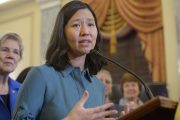
There could be no better place than the Flickertail State — which has the lowest unemployment rate in the country and a thriving energy-based economy — to attempt this unprecedented experiment in government by the people.
Charlene Nelson (pictured) of Empower the Taxpayer is one of the driving forces behind Measure #2, as it is known. She was instrumental in ensuring that the 30,000 signatures needed to get the property tax proposal on a statewide ballot were collected.
In addition to being a municipal judge for the city of Casselton, Nelson, a resident of North Dakota for 18 years, is also a homeschooling mother of three who enjoys gardening. She agreed to an interview with The New American.
TNA: Property rights proponents like to argue that the property tax turns homeowners into tenants to the government in that they are obligated, rain or shine, to pay this regressive tax. Is that why you want to end property taxes, so that North Dakotans are no longer penalized for owning property?
NELSON: The short answer: yes.
When we look at where we should start cutting (or eliminating) taxes, we should look first to the more harmful taxes. Property taxes are the most harmful because:
1- They are not connected to a person's ability to pay.
2- They punish homeowners for investing in their neighborhood and so encourage blight.
3-They are the most expensive tax to administer. In North Dakota the cost of assessing, collecting, and administering the property tax is around $50 million. That's roughly nine percent of what's collected.
4- They are a tool used by the power elite to benefit a chosen minority (new businesses, new commercial or residential developments, some of the poor or elderly) at the expense of all the other homeowners.
5- They discourage new business, especially capital-intensive industry, which provides long-term economic stability and high wages.
6- They are a hidden tax which everyone bears, but few are aware of. This allows governments to increase spending (and thus the property tax) with little reaction from the voting public.
And I believe they are immoral for the reason you first mentioned. In reducing the citizen to little more than a serf, we turn the entire relationship between the citizen and his state on its head, putting the citizen at the mercy of governments and the special interests that drive government budgets.
TNA: If Measure #2 becomes a constitutional mandate, how will local subdivisions pay for such services as public safety and education? By increasing other taxes? Through oil revenues? By tapping into your state’s surplus?
NELSON: None of those is needed. First, according to the North Dakota Policy Council Pork Report, there is about $1 billion in wasteful spending in our state. The measure provides an incentive for legislators to eliminate the waste. Second, the increased economic activity (generated by new business investments and by families that have an extra $4,000 to spend) will generate a tremendous increase in sales and income-tax revenues that will pay for the measure. Yes, the state's surplus does provide an extra source of funding for those that doubt passage of Measure #2 will increase revenues. But there is no reason to anticipate other taxes will need to be raised.
TNA: According to a Beacon Hill Institute [Massachusetts] study, a permanent property tax abatement for homeowners and businesses in North Dakota could create 12,000 new jobs. This is a big deal for a state with a small population like yours. So why is the North Dakota Chamber of Commerce one of your most ardent foes?
NELSON: Yes, that's a four-percent increase in private-sector jobs — something any state would be pleased to see. There are two reasons: The Chamber of Commerce does not represent business interests. Look at who their board members and chartered members are. A large number of them are governmental entities who have a vested interest in keeping the tax. Second: many of the members of the Chamber are businesses which currently enjoy property tax abatements and do not want to lose the economic advantage that gives them over their competitors.
TNA: What does it take — in terms of cost and volunteers — to mount this campaign?
NELSON: We have about 300 volunteers around the state who gathered the signatures. Many have also donated financially to the campaign. We hope to raise $2 million — nowhere near what the opposition will spend. The NEA [National Education Association, the national teacher's union] has pledged $4-5 million to defeat this measure. But this is such a popular issue I don't think we'll need to spend as much to counter their propaganda.
TNA: Any high-profile politicians or community leaders who publicly support Measure #2?
NELSON: There are two cosponsors of the measure who hold office: Dan Ruby is a state representative and John Feldahl is a county commissioner. Support around the country comes from presidential candidate Ron Paul, who also wrote the foreword to our book, Property Tax Revolution: It's Our Home, Not Theirs! We also have endorsements from Randy O'Toole [Cato Institute], Paul Bachman [economist, Beacon Hill Institute], and Ed Meese of the Heritage Foundation.
TNA: What is your secret for juggling homeschooling and being the spokesperson for a statewide campaign?
NELSON: Juggle is the right word — keep moving so that none of the balls has a chance to fall down. Really, it's not anything I do — it's my family and our many supporters. I have a very supportive husband who encourages me and wants to see this passed as badly as I do. And I have equally supportive (and cooperative) children. I also have lots of help from volunteers who want to secure the blessings of a property tax-free state for their children and grandchildren. It is for their future that we do this.
TNA: Thank you for your time.
NELSON: My pleasure.
Isabel Lyman, author of The Homeschooling Revolution, blogs at The Castillo Chronicles.
Photo: Charlene Nelson




